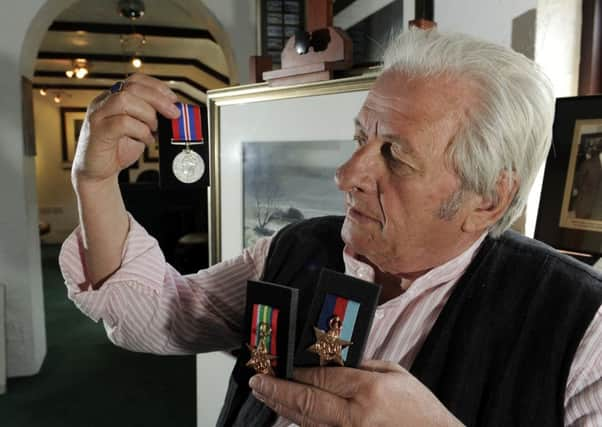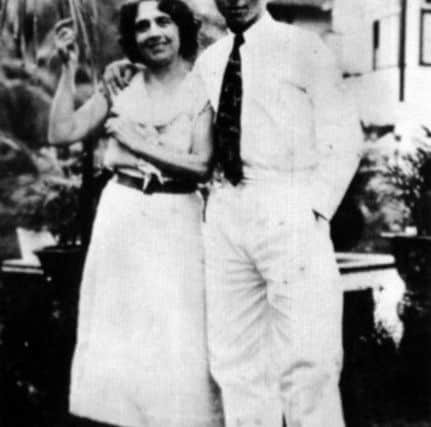Ashley Jackson: The father I never knew


But the self-styled “People’s artist”, based in Holmfirth, wasn’t born in Yorkshire and neither was his father. Instead, Norman Valentine Jackson, like Ashley, was born in the searing heat of Penang in Malaysia.
However, the time they spent together was to prove tragically short-lived. Ashley was barely a toddler when he, along with his mother and a whole host of aunts and uncles, was hurriedly put on board a ship by his father in Singapore, bound for India.
Advertisement
Hide AdAdvertisement
Hide AdIt was February 1942 and with the Second World War raging the Japanese were rapidly closing in on what was then a strategic outpost of the British empire. Singapore, dubbed the “Gibraltar of the East”, had been regarded by the British military top brass as an impregnable fortress.


But Norman Jackson didn’t share their optimism and his fears were well founded as the Japanese army swarmed through the supposedly “impenetrable” jungle, effectively walking in through the back door.
With the net closing in, civilian ships made a dash for it. As they steamed out of the harbour the Japanese bombarded the fleeing vessels, many of which were sunk.
The one carrying Ashley and his family escaped, but it would prove to be the last time he saw his father who, as a Private in the Straits Settlements’ Volunteer Force, stayed behind to defend Singapore.
Advertisement
Hide AdAdvertisement
Hide Ad“I was less than 18 months old when I last saw him,” recalls Ashley. “People often say they remember someone when they don’t really and I can’t say I remember him, I wish I did.”
Despite this gaping hole in his life he feels that his father was a kindred spirit.
“Even though I never knew my father I’ve always felt close to him somehow. That probably sounds strange given the fact I never spoke to him, but it’s a feeling I’ve always had.”
Over the years Ashley has pieced together a picture of him from a handful of photographs and documents that survived, along with the precious memories of family members. “When I was growing up the only details I had about him came from my grandmother and my mum,” he says.
Advertisement
Hide AdAdvertisement
Hide AdHe was told that before the war his father had worked his way up the ladder to become general manager of the Tiger Beer Company in Singapore.
He discovered, too, that during the 1930s his father travelled with a Japanese friend to Tokyo where they were arrested and accused of being spies. “They released my dad and he went back home but he never saw his friend again.”
It’s something Ashley believes meant his father’s card was marked when the Japanese later captured Singapore.
He had stayed behind to fight and along with Ashley’s grandfather and three of his uncles was among the 100,000 British and Allied troops forced into captivity.
Advertisement
Hide AdAdvertisement
Hide Ad“I was told that my dad was a good harmonica player and apparently he played a few patriotic songs as they were marched off to jail.”
His father was sent to Changi Prison, one of the most notorious PoW camps used by the Japanese for forced labour.
Some of the men were made to work in the docks where they loaded munitions onto ships, while others were forced to clear sewers damaged in the attack on Singapore. Those less fortunate were later sent to work on the infamous Burma railway.
Dysentery was rife and the men who were too ill to work had to rely on those who could for their food. Ashley’s father escaped from Changi several times and formed part of search and destroy teams before being recaptured.
Advertisement
Hide AdAdvertisement
Hide Ad“He spoke Japanese and Malay and I found out that he led some of the troops through the jungle after they escaped. They formed platoons and kept on fighting even when they were on the run.”
After one escape attempt too many, though, he was sent to another camp on the remote island of Labuan off the coast of Borneo. “He’d escaped five times and I think they’d had enough of him which is why they sent him there.”
Ashley’s grandfather and one of his uncles survived the horrors of the Japanese PoW camps but his father was not so fortunate.
By June 1945 the Japanese had all but lost the war and were in full retreat. But as Australian soldiers closed in on the camp the prison guards gave the remaining prisoners a shovel and ordered them to dig their own graves. Each was then shot dead, including Norman Jackson.
Advertisement
Hide AdAdvertisement
Hide AdIn a cruel twist of fate the Allied soldiers reportedly reached the camp just 24 hours later.
Today, his father is among those buried in a British and Commonwealth cemetery on Labuan that contains the graves of 80 soldiers killed by the Japanese.
Ashley, like so many victims of the war, grew up without his father and decades later he made an emotional journey to the Far East visiting some of the places where his father was detained.
“I got his name put on the cenotaph in Singapore and I made a pilgrimage to Changi jail. Outside there’s a little chapel where I left a message saying, ‘To my dad, Norman. Much regrets, love you – Ashley.’”
Advertisement
Hide AdAdvertisement
Hide AdOn his return he created a series of paintings of Penang for an exhibition in 1995 at the Cooper Gallery in Barsnley which he dedicated to his father called Here’s to you Dad.
Earlier this year Ashley contacted the Ministry of Defence Medal Office and in May he received his father’s medals – 70 years after he was killed.
“It can never bring him back but it means that it is publicly recognised that he fought and died not just to protect my mum and I, but for King and Country.”
Although he never got to know his father and has lived with that sorrow his whole life, he says that in some respects it has shaped the person he is today.
Advertisement
Hide AdAdvertisement
Hide Ad“Growing up I didn’t feel like I had a proper family which is why I wanted to have a family myself and I’m lucky that I’ve got one. We’re very close knit there’s me and my wife Anne, my two daughters and four grandchildren.”
Ashley, who is now 74, says he’s only alive today because of the actions of his father. “He knew the Japanese were coming and he realised how dangerous the situation was. It must have been hard for him saying goodbye to his family but he saved our lives, he was the one who got us on that ship.”
There is regret about the bonds that were so cruelly severed, but pride, too.
“He didn’t live to see me grow up and become an artist and a dad myself. I would have loved to have known him and I hope he would have been proud of me,” he says.
Advertisement
Hide AdAdvertisement
Hide Ad“People might think it’s daft but he’s always been with me in spirit. To this day I still have a photograph of him on the wall and I’ve never forgotten him – he’s always in my thoughts.”
PORTRAIT OF THE ARTIST
Ashley Jackson was born in Penang in October 1940.
His family moved to Yorkshire in 1950 when Ashley was nine years old.
He opened his first gallery at Dodworth, near Barnsley, in 1963.
His evocative watercolour paintings of his beloved moors have become synonymous with Yorkshire and his works have been seen all over the world.
Advertisement
Hide AdAdvertisement
Hide AdA Brush with Ashley, his popular television series, ran for nearly 10 years.
In 2006 he received a Lifetime Achievement Award at the Yorkshire Awards.
Ashley still paints today and last year he helped launch an art project called Framing The Landscape, aimed at creating a permanent, ever-changing outside art exhibition.